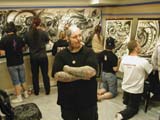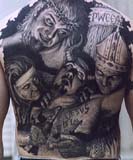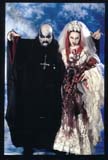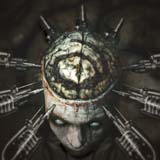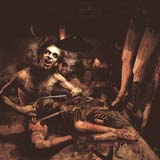|
JUXTAPOZ Art of Rock Special Issue, Summer 2003 Paul Booth interviewed by George Petros A master of the macabre makes human flesh a glorious thing. PAUL BOOTH, deadly decorator of hard rock's royalty, speaks to George Petros. PAUL BOOTH transforms flesh into canvas. Whoever comes to him natural-born goes away as a living work of art. Whoever says "I do!" to his mighty tattoo machine might get skinned alive by collectors of forbidden flesh! In candlelit smoke enveloped by darkness he hovers; from his coal-miner's head lamp a beam of light cuts the foggy, creepy ambience. Machine in hand, he bends over; beneath him a tattooee tenses, whirring noises begin, blood flows, and screams fade to satisfied cries.
Booth's New York shop, Last Rites, seems like the set of a science fiction horror flick. A paradise made putrid by biomechanical decay, within the bowels of satan's spaceship, therein does this guy apply vicious skin art to a lucky few. The roster of his adorned ones comprises a heavy metal who's-who. What will happen to their decorated skins after the grim reaper mows them down? Paul collects body parts, like the pair of old lady's ears still sprouting gray hairs. Perhaps his clients secretly will him their hides. Who knows? The following conversation illustrates the essential Boothian universe. For more details or trivia, consult the websites; for your hide to be made art, crawl into Paul's shop. JUXTAPOZ: For the benefit of our readers, please describe the shop we're in. BOOTH: We're surrounded by a version of hell on earth-things I've collected from around the world, gifts from clients-everything's dark in my little lair here. Body parts, bones, weapons, rusty old scary pieces of metallic axes and scythes-it's all about atmosphere. It's the only shop with a smoke machine. I work by candlelight with a little head lamp; it's dark and really atmospheric. It keeps people calm. JUXTAPOZ: How did you come to be in New York? BOOTH: Originally I had a little shop in Boonton, New Jersey, where I grew up. It was an out-of-the-way hole in the wall. I didn't have much need for a street shop because most of my clientele came from my magazine coverage. I broke up with my girlfriend and realized it was time to force-feed myself a life, so it was time to get the hell out of Bumfuck. That was-I can't remember what year that was, probably like five years ago. Late Nineties. I moved here to have the freedom to do what I want. I wanted to be with my own-you know- JUXTAPOZ: Your own kind? BOOTH: I don't really know; I guess anyone that's not on the normal plane. Here it becomes normal to be a freak. I came here for sanctuary. I'm reclusive; I don't really go out. I go for a week at a time without seeing sunlight. JUXTAPOZ: Tell us about your fascination with death. BOOTH: I don't even know where it comes from. I drew skulls and morbid shit on notebooks back in the first grade. I just seem to have always been here. JUXTAPOZ: Is it the result of past life experiences or of too many horror movies? BOOTH: I'm not much on spiritual stuff. JUXTAPOZ: So, what's out there? BOOTH: I don't believe in any higher power. I am, in my book, a satanist. It's my own brand-a bit Anton LaVey and a bit Booth. There is no higher power than yourself. I put my faith in myself and my own abilities.
JUXTAPOZ: How did you get into tattoos? BOOTH: Wearing a tattoo, to the mainstream public, is such an extreme thing to do. You have to deal with a lot of pain and you have to have a lot of balls and not be afraid of commitment. Tattooing has always been popular among the outcasts. It was stereotyped as criminals and drunks- JUXTAPOZ: And by people who wanted to project power from their bodies. It wasn't for the feint of heart. BOOTH: A tattoo is a right of passage. It's a way of feeling more like a man or feeling tougher or gaining social acceptance within a group. It's an endurance test. JUXTAPOZ: What was your first tattoo? BOOTH: My first tattoo was, at nineteen I got my daughter's name - Tabitha JUXTAPOZ: Who did it? BOOTH: Ernie White in Jersey, the guy who taught me originally. JUXTAPOZ: What's his story? BOOTH: It was a very traditional East Coast tattoo shop- JUXTAPOZ: What is that? BOOTH: Well, we did a lot of panthers, a lot of roses, a lot of Tasmanian Devils-it was a walk-in street shop. JUXTAPOZ: Flaming eight-balls. BOOTH: Skulls. Kitsch. Pick a design off the wall and have it tattooed on your arm. Traditional American-style tattooing back in the mid-Eighties was less regarded as an artform. There weren't a lot of art students becoming tattoo artists. My roots are in the traditional; I cut my teeth doing traditional flash. If it wasn't for that I wouldn't be where I'm at now. JUXTAPOZ: Where is that? BOOTH: Tattooing has been glorified to the point where many artists, within the tattoo world, are like rock stars. JUXTAPOZ: Like yourself? BOOTH: I suppose. I try not to think about my status-I know that I receive a lot of attention and accolades, and while I choose not to dwell on it I am aware of it. JUXTAPOZ: You've worked very hard to get where you are. BOOTH: Maybe it's a cliché, but the tattoo industry has been so good to me, I feel an obligation to give something back. If I'm able to use my influences and my reputation to do something positive for the industry, I wanna do my part. JUXTAPOZ: Has it been good to you financially? BOOTH: I can't complain. I'm more of an artist than a businessman, but I'm able to explore the hobbies and ventures that I want-setting up video production so I can make horror movies, and I'm able to live comfortably enough. JUXTAPOZ: What's your fusion thing?
BOOTH: ArtFusion is about collaborative art. I was repeatedly told throughout my career that tattoo artists just can't work together. Tattooing's the sort of artform where it's a one-man act; it's a solo show. The average tattoo artist has to do their own management, their own PR, and their own art. And, we're basically a bunch of social misfits-a bunch of egomaniacs with inferiority complexes. I wanted to test those boundaries. I wanted to use the universal language of art to bring together these artists who are notorious for not getting together. ArtFusion is about tattoo artists painting together and learning from each other, because underneath tattooing lie the same principals of all art, on canvas or any other medium. Our fusion represents that universal language and community involvement. A fusion of styles, with ten artists working on one painting that only tattoo artists could produce. At conventions, at museums, I've been told that tattooing is not art- JUXTAPOZ: What is it, then? BOOTH: They couldn't go beyond that. JUXTAPOZ: What did they imply? That you're in the same category as chiropractors and prostitutes, who always are touching somebody's skin- BOOTH: Right. Fully absorbed by the stereotypes. As an artist I'm not okay with that, and many of my peers are also not okay with that. I've seen some incredible art on skin, and I feel it has every right to be hanging in museums and galleries, the same as any other medium of art. That's what's driven me to cultivate the ArtFusion experiment. I see it as a vehicle to increase public awareness of this particular medium. JUXTAPOZ: With whom do you do this? BOOTH: There's my partner Filip Leu and Guy Aitchison; we've dedicated ourselves to really pushing this thing. We do these ArtFusion camps around the world. We charge an entry fee that goes to supplies and gallery rentals. JUXTAPOZ: What do attendees get out of it? BOOTH: The inspiration-every artist that's been involved has walked away having learned something from their peers. The creative energy in the room is unsurpassable. There's fifty to seventy-five artists from around the world creating together-the vibe is just incredible. It's something new within the tattoo industry. It's an underground art movement. JUXTAPOZ: Tell us about the art you're doing now.
BOOTH: My art is a fusion of a lot of different media. It starts with set design and make-up and photography, and then I use acrylic paints and charcoal, and then I fuse it all together in Photoshop, where I overpaint everything using graphic tools like airbrushes and special brushes I create it. I print it, and then paint over it again. JUXTAPOZ: What about the printing? BOOTH: It's called a Repligraph. It's a photographic process of oil sublimation onto mylar. You transfer a digital image onto mylar and then heat-seal it onto a canvas. JUXTAPOZ: It prints in oil rather than ink. BOOTH: That allows it to be colorfast, with no bleed- JUXTAPOZ: So you can get it wet. BOOTH: Right. The sun won't fade it; it's guaranteed for life. My life is good for about 300 years. In printing, this is the absolute highest standard. Another process I've seen, that as of yet I don't have a use for, is called Artograph, where they do the Repligraph process and they make a mold of the original surface texture of a painting, cast its brushstrokes in a gel medium, and fuse it onto the new surface. I waited years to make prints of my digital art cause I was so dissatisfied with ink-jet. I'm into dimension and trying to build images that you can reach into. The Repligraph process gets this for me. JUXTAPOZ: You take the printed piece and treat it like a canvas. BOOTH: Yes. I've had it said to me that if it's a digitally-manipulated image then it's not fine art. I don't give a shit about that at all. I sit in front of the computer and paint as if I was using a paint brush for hours on end. The fundamentals of creativity remain the same. JUXTAPOZ: You don't have to rationalize it to me. A computer is a tool, like an airbrush. BOOTH: It's the end result that's the art, anyway.
JUXTAPOZ: The idea is what counts. Every new technique was blasphemous when it was introduced. BOOTH: This all started when I was editing tattoo photos for magazines on the computer. I'd start fucking with the image in Photoshop. I was happy to not be doing Tasmanian Devils any more, and to be able to do what I wanted. JUXTAPOZ: That's what you like to do. BOOTH: Ninety percent of my clientele comes in and gives me an area of skin to do what I want with. I'm known for having a shitty bedside manner-if someone's in pain, I'm laughing. I'm kind of a dick, but it's more of a joke. It's an alternative way of making people sit still, without moving, in the chair. They're so mad at me for making fun of them that they'll sit still outta spite, you know? The freedom that my customers give me allowed me to approach tattooing no differently from any other medium that I work in. The tattoo process is identical to every other medium I work in-sculpting, painting, digital manipulation-whatever it is, they're all interchangeable to me. JUXTAPOZ: Who have you tattooed? BOOTH: I've always been inspired by music. Some music gave me such inspiration that I've found the people who make the music and collaborate with them to see what we come up with. When I started tattooing I thought, "Man, it would be cool to tattoo Slayer" – and now I'm friends with them. I'd sit there and do a tattoo while listening to Slayer, and the vibe that put in my head was just tremendous-it would really open up creative vibes. A good tool for the dark art I create. JUXTAPOZ: Did you do all of the Slayers? BOOTH: No, I've done a few. Kerry King-I did his head. I'm still trying to finish some work on Tom Arroyo. It's hard because crossing paths with these bands is difficult. JUXTAPOZ: Did you tattoo them while on the road? BOOTH: At times. A lot of guys don't like to get tattooed on the road because of the stress of touring. But I went out on Ozzfest quite a few times-I was backstage tattooing and hanging out with bands. JUXTAPOZ: Who else did you do? BOOTH: Pantera-Phil and I have known each other for quite a while-Slayer, Slipknot- JUXTAPOZ: Who else? BOOTH: The Undertaker from the WWF-that was cool. We did it in a hotel room. When he walked in he had to duck and turn sideways to fit through the doorways. He was in character the whole time. He only talked when he was asked a question. He was a nice guy, quiet and menacing-which I enjoyed. JUXTAPOZ: What did you put on him? BOOTH: A demon. I remembered a pose I saw him in where he looked menacing, and that stuck in my head, and that sorta came out. It's on his bicep. And Limp Bizkit - JUXTAPOZ: Who there? BOOTH: I used to know Fred pretty good, and I started a back piece on him, and I started some work on the other guys, but it kinda trailed off-I haven't finished Fred's back. JUXTAPOZ: How long has it been? BOOTH: It was about half-finished, and it's been two or three years. And I usually don't leave stuff unfinished. I also don't run around chasing people to finish the work. JUXTAPOZ: So, who else? BOOTH: Sevendust, Coal Chamber, Sepultura, Deftones-it's mainly been hard rock. People who do aggressive things tend to gravitate to one another. JUXTAPOZ: How about chicks? BOOTH: My stuff is too overpowering-this is basically what they tell me. They dig the art, "but it's not for me." But I love tattooing women. Their skin is better, they sit better- JUXTAPOZ: I've seen some nasty tattoos on chicks. BOOTH: Oh yeah. I've had chicks want wiccan-type stuff, like gothic wiccan-but I can only do what I can be into, so if I can't be into it I just decline. JUXTAPOZ: Ever turn down a rock VIP? BOOTH: I don't know if it was a turn-down, but I was talking to Jonathan from Korn, and he was describing the work he wanted, and honestly it just wasn't my bag, you know, so I just told him I'm really not the guy for that job. He wanted really bright, colorful toys-twisted toys-and it sounded like a lot of fun, but I didn't feel comfortable because it's not my forte. Regardless of whether they're a celebrity or not, the art comes first. JUXTAPOZ: Why do some people say shitty things about you? BOOTH: They love to talk. Not everyone can like you. So, you create enemies whether you want to or not. Early in my days, on the rise, I was concerned with what they said. It used to bug me when I'd hear stuff. Now I think it's all just silliness and I could care less. I've risen above my own issues. I hear that I do what I do for hype and novelty, and that it's all bullshit-that's something I laugh at because I was a satanist before I was a tattooist. JUXTAPOZ: What do you say to your detractors? BOOTH: Come on down; let's talk. Last Rites |
|||||||||||||||||||||
